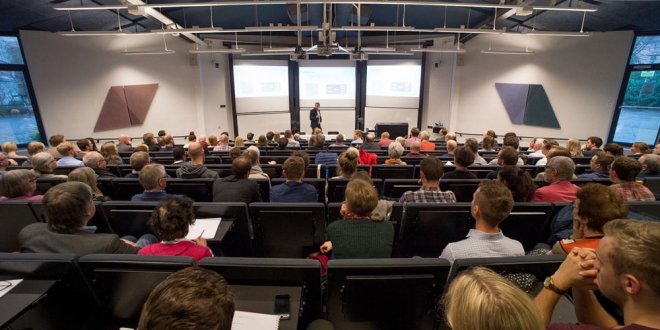The Department of Political Science hosted a theme night about intelligence analysis, a programme offered by the department. The evening had five different speakers who, from their perspective, explained why the subject was interesting for students and the world.
By Henrik Pehrsson, Translation by Viktor Jönsson
On the invitation, the department aimed for those in Lund who are interested in puzzles. At 6 pm, the room was almost full, which might have surprised someone – but surely made the Department of Political Science happy.
The student Simon Fridolfsson moderated the theme night and kept it brief. With military discipline, the event started at 18.00. Both young and old in the audience seemingly got the hint, and only some of the latecomers were noted.
First out was Magnus Anderson, a postgraduate at the department and head of analysis at Polisen Region Syd (the Police South Region in Sweden). He spoke of the intelligence work the police do and tried to clarify the bridge that could exist between the theoretical social science and police work. Towards the end of Andersson’s speaking time, he made a GTA reference which might have gone over half the audiences’ head.
Per Thunholm, a postgraduate and senior analyst at the Swedish Defence University approached the topic of the evening from how the defence intelligence works. He spoke about how laws and intelligence work in modern time has been revised to fit an ever-changing world, for example, that internal and external threats have become more and more difficult to separate. FRA Must, FOI and FMV were Swedish intelligence organisations that was briefly mentioned.
“I’ve reflected on the fact that the debate in Sweden after Edward Snowden’s reveal from an international comparison was significantly more modest. The reason could be that both transparency and supervision was increased significantly by adding the signals intelligence law with a lot of additions, like establishing a signals intelligence court, a stronger inspection- and supervision agency, stronger integrity protection etc. When making an international comparison, Sweden has a good standing. It is, however, important that there is a debate regarding these questions”, says Per Thunholm.
We reach a form of consensus that it also could be explained by the fact that the Swedish people’s trust regarding public institutions is relatively high. Even if Thunholm noted that it has been decreasing and chiefly among the young.
It was good then when the student Helena Engleson later explained intelligence analysis as a science and how you can survey institutions where decisions regarding authenticity is a central part. She talked about her own academic experiences, which included an ongoing master programme in political science and an ongoing storyline on the subject.
Per Thunholm confirmed that it is important for the intelligence agencies recruit from a broad palette of academics.
“It is hard to set up the goal to work for an intelligence agency and finding the perfect education. Intelligence work requires many skills where economists, psychologists, political scientists, information scientists and linguists is but a few. I can, however, recommend the subject of intelligence analysis as it is a method, approach and competence which can be applied to many fields of work. Language is also very important”, says Per Thunholm.
This is yet another reminder that it would have been beneficial to have studied that course in Chinese in high school.
Otherwise, it clearly was an interesting evening where even Kristina Skarvik, founder of Kasparos AB, and professor Wilhelm Agrell contributed. The event kept its promises and at least increased my interest in intelligence analysis. Even if I find puzzles to be quite boring.






